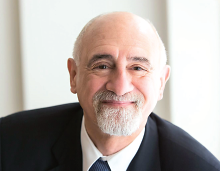Muskin Goes to Capitol Hill With Message On Effectiveness of MAT
Abstract
Elected leaders want to hear from physicians, says APA’s treasurer after a visit to Capitol Hill.
When you’re a physician, people on Capitol Hill listen.
That’s what APA Secretary Philip Muskin, M.D., M.A., learned last month when he met with Rep. Joseph Crowley (D-N.Y.) and senior policy advisors to House and Senate Minority Leaders Rep. Nancy Pelosi (D-Calif.) and Sen. Charles Schumer (D-N.Y.) to talk about addiction and the opioid crisis.

APA Secretary Philip Muskin, M.D., M.A., says that psychiatrists’ clinical experience of treating mental illness and addiction commands respect when they are meeting with legislators.
His first stop was a luncheon for Crowley hosted by a coalition of physician groups. When it became apparent that there was, in fact, only one physician present, Muskin had the congressman’s undivided attention. “Elected leaders want to hear from doctors,” Muskin said.
During the exchange he emphasized the importance of building an infrastructure for delivering evidence-based medication-assisted treatment (MAT) for addiction. That includes providing resources for training physicians in MAT and ensuring that there is access to follow-up care in the community when a patient leaves the specialty clinic or is discharged after an inpatient medical or psychiatric evaluation. He also explained the need to align substance use medical records with HIPAA for patient safety and to coordinate care using electronic health records.
He carried the same message to Pelosi and Schumer, emphasizing the important role psychiatrists play in treating addiction and the need for an increased workforce of psychiatrists trained in delivering MAT.
“We know how to treat addiction,” Muskin said in an interview, “and there is a solid evidence base for medication-assisted treatment. The good news we should deliver to political leaders is that this is a solvable problem—not easily solvable, but it’s a problem for which we have solutions.”
MAT is the use of FDA-approved medications—including buprenorphine—in combination with counseling and behavioral therapies to provide a “whole-patient” approach to the treatment of substance use disorders. To prescribe or dispense buprenorphine in office-based settings, physicians must qualify for a waiver from the Drug Enforcement Agency, which includes completing eight hours of training.
APA provides waiver-eligible training through an online course and courses at both the Annual Meeting and IPS: The Mental Health Services Conference. APA’s training is made available through the Providers’ Clinical Support System for Medication Assisted Treatment (PCSS-MAT), funded by the Substance Abuse and Mental Health Services Administration.
Muskin also emphasized that criminalization of addiction is not the answer and drew special attention to the needs of pregnant women who have a substance use disorder and may be reluctant to seek out treatment. “Addiction is an illness,” he said. “I’ve yet to meet anyone—no matter what their background is—who said ‘I want to become a heroin addict.’ No one thinks they are going to get addicted.”
Muskin said it’s clear to him that being a physician carries weight in the halls of Congress. He said residents and early career psychiatrists should get training in advocacy, and he urged faculty and practicing psychiatrists in the community to reach out to APA and district branch staff and let them know of their interest. Staff can help prepare members for meetings with representatives by providing background context and detailed information about legislation. What ultimately counts in persuading legislators is the story that only a psychiatrist with clinical experience can tell.
“If you have something to say, they want to hear it, and they will make the time to do so,” Muskin told Psychiatric News. “They did for me.” ■



